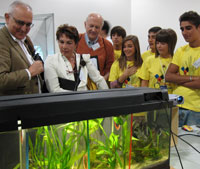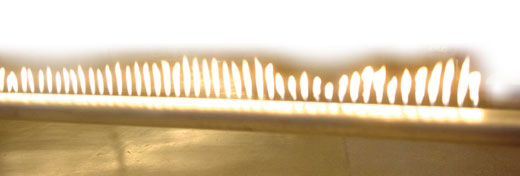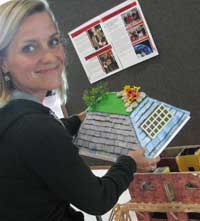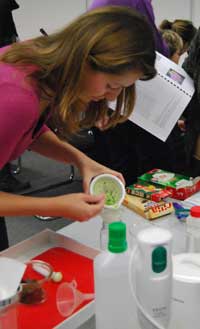Science on Stage: recent activities Inspire article
As the whirl of national Science on Stage activities continues, Eleanor Hayes reports on some recent events from Spain, German and even Canada.
Spain and Portugal: Ciencia en Acción


memories?
Image courtesy of Ciencia en
Acción
Dancing with fire, cooking with solar energy, and adopting a star – this event offered performances, competitions and activities for everyone. From Spain, Portugal, Argentina, Colombia, Mexico, Peru, Salvador and Uruguay, 500 teachers, 250 school students and 7000 members of the public flocked to the Ciencia en Acciónw1 festival in Granada, Spain, from 25-27 September 2009.
‘Science in Action’ – there could not be a better name for this dizzying display of science. One hundred and forty school and university science teachers presented some of the best projects from the Spanish- and Portuguese-speaking countries, sharing their ideas for engaging young people with science. These included dramatic physics and chemistry demonstrations, practical activities for biology and geology, sustainability projects, science films and much, much more.

Image courtesy of Ciencia en Acción
For the general public, two research scientists brought their subjects – the theory of evolution and the development of vaccines for Alzheimer’s disease – to life. For those looking for something still more dynamic, there were three eye-catching scientific performances. In ‘The Dance of Fire’, visitors discovered fire, music and the characteristics of waves using the Rubens’ tubew2 (see image). A presentation of the physics of sound conveyed some difficult physical concepts in an entertaining way: the fundamentals of aerodynamics and aviation, including Bernoulli’s theorem and aerodynamic drag. Finally, participants had the opportunity to ‘Cook with the Sun’, assembling solar ovens and using them to prepare – and share – delicious dishes in the open air.
The Ciencia en Acción festival also hosted the final event of the ‘Adopt a Star’ competition – the Spanish version of the international ‘Catch a Star’ competitionw3 for young people. Three hundred teams from Spanish- and Portuguese-speaking countries had entered the competition, either investigating their favourite celestial object or astronomical phenomenon, or developing an astronomy outreach programme. For the final event, 17 teams with a total of 80 school students presented their projects. The two winning teams were awarded a trip to the Spanish National Research Council (Consejo Superior de Investigaciones Científicas, CSIC), and a telescope.
Science on Stage Canada

technology teacher from
Canada, displays her
students’ renewable energy
project, built to scale
Image courtesy of Science on
Stage Canada
August 2009 saw the first Science on Stage eventw4 in Canada: small, but very much in the Science on Stage tradition. The Canadian Light Source at Saskatoon welcomed 12 teachers and other educators from Canada, Australia and Germany for five days of fun and hard work. In the science fair, all participants presented their teaching projects, sharing and swapping ideas with their colleagues. More formal discussions were organised to address major issues in science education, such as how to improve teacher training or motivate students to study science; state and private education; and assessment.
An important element of any Science on Stage event is direct contact between teachers and scientists: at the Canadian event, scientists from the Canadian Light Source met with the teachers, explaining how a synchrotron works and how they analyse their research results.
Science on Stage Germany
The German Science on Stagew5 organisers continue to be busy – not only playing an important role in the establishment of Science on Stage Europe (Hayes, 2009) but also organising smaller national and international events.

Science on Stage Germany
teacher training workshops
Image courtesy of Science on
Stage Germany
In June 2009, 52 participants from 13 countries met at the Gläsernes Labor in Berlin for the third workshop on ‘Teaching Science in Europe’. Building on the previous workshops at Science on Stage 2 and the international Science on Stage festival 2008 in Berlin, the teachers continued this European exchange on three topics: science in kindergarten and primary school; the benefits of non-formal education initiatives; and moderating science lessons. The outcomes will be published in June 2010 and distributed via the Science on Stage Europew6 network.
In September 2009, Science on Stage Germany, THINK INGw7 and MINT-ECw8 co-organised the EduNetwork fairw9. For the participating teachers, there were lectures and workshops on mathematics, astronomy, nanotechnology and how to support talented students, as well as an exhibition of education-related companies.
During the International Year of Astronomy, THINK ING, the journal Life and Sciencew10 and Science on Stage Germany invited teachers from Germany and other German-speaking countries to submit ideas for teaching astronomy. The 12 best projects were published in Life and Science, and the award ceremony took place on 24 September in the Völklinger Hütte, the UNESCO World Heritage Site at the old Völklingen ironworks.

Science on Stage Germany
teacher training workshops
Image courtesy of Science on
Stage Germany
First prize went to Inge Theiring for her bilingual project ‘Cosmological and general relativity phenomena in astrophysics’, while Lutz Clausnitzer took second prize with ‘Astronomy as interdisciplinary learning platform’. Christoph Noack, with his project to investigate the connection between religion and astronomy, entitled ‘Creation and evolution’, was awarded third prize. The Science on Stage international and national events bring together several hundred of the best teachers from across Europe to share their teaching ideas, but it is important that these ideas are spread beyond the festivals’ participants. To this end, Science on Stage Germany is running a series of teacher training workshops in Berlin to present projects from previous festivals.
On 13 November, 30 teachers from Berlin and Brandenburg attended a half-day workshop to learn about two such projects. The German project, ‘If colours become a health problem – coloured T-shirts with colours of plants’, began with a newspaper article about the recall of children’s clothing that contained harmful dyes. In an interdisciplinary project, the students then researched which dyes have been and continue to be important, and which harmless dyes could be used instead.
The Austrian smoking prevention project uses the ‘Smoking prevention lab’ to discourage 14- to 18-year-old students from smoking. The affordable device – developed together with school students – helps to visualise and explain the effects of smoking on pulse rate, blood flow and blood pressure, as well as on the temperature of fingers – without the students having to smoke. The ‘Smoking prevention lab’ is a good example for European exchange: after the international Science on Stage festival 2008, three German participants joined the Austrian project, extending it to cover topics in biology and chemistry.
References
- Hayes E (2009) Science on Stage: heading for a country near you. Science in School 13: 2-3. www.scienceinschool.org/2009/issue13/sons
Web References
- w1 – For more information about the Ciencia en Acción festival and details of the ‘Adopt a Star’ competition, see: www.cienciaenaccion.org
- w2 – For instructions on how to build your own Ruben’s tube, including videos and background information, see: www.instructables.com/id/The-Rubens_-Tube:-Soundwaves-in-Fire!
- w3 – The ‘Catch a Star’ competition is organised by the European Association for Astronomy Education: www.eaae-astronomy.org
- w4 – For more information about Science on Stage Canada (in both English and French), see: www.scienceonstage.ca
- w5 – More information about Science on Stage Germany is available here: www.science-on-stage.de
- w6 – Copies of the publication Teaching Science in Europe 3 can be obtained from the national steering committees. To find your local contact, visit the Science on Stage Europe website: www.science-on-stage.eu
- w7 – THINK ING is an initiative of the German Association of Metal and Electrical Industry Employers. To learn more, see: www.think-ing.de
- w8 – Organised by employers in the fields of science, engineering and technology (SET), MINT-EC (Verein mathematisch-naturwissenschaftlicher Excellence-Center an Schulen eV) encourages more young people to enter SET careers. For more details, see: www.mint-ec.de
- w9 – To learn more about the EduNetwork fair, see: www.edunetwork.de
- w10 – To learn more about the German-language Life and Science journal, see: www.lifeandscience.de





